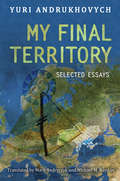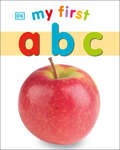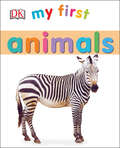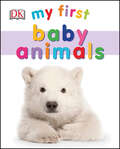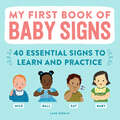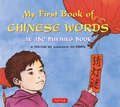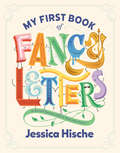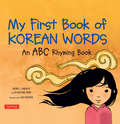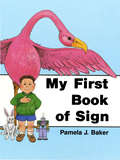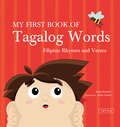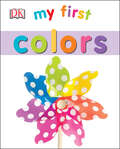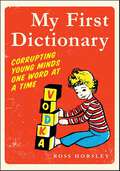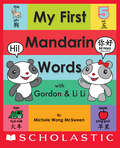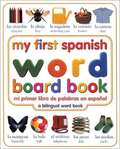- Table View
- List View
My Emily Dickinson
by Eliot Weinberger Susan Howe"Starts off as a manifesto but becomes richer and more suggestive as it develops."--The New York Sun With exacting rigor and wit, Howe pulls Dickinson free of all the sterile and stuffy belle-of-Amherst cotton wool and shows the poet in touch with elemental forces of nature, and as a prophet in all her radical zealotry and poetic glory. Her Emily Dickinson is a unique American genius, a demon lover of poetry--no neurasthenic spider artist. Howe draws into her discussion Browning, Wuthering Heights, the Civil War, "Master," the great Puritan preachers, captivity narratives, Shakespeare, and phantom lovers. As she chases away narrow and reductive feminist readings of the poet, Howe finds instead a radically powerful and true feminism at work in Dickinson, focusing the whole on that heart-stopping poem "My Life had stood--a Loaded Gun." A remarkable and passionate poet-on-poet engagement, My Emily Dickinson frees a great poet from the fetters of being read as a special female neurotic, and sets her against a fiery open sky where "Perception of an object means loosing and losing it...only Mutability certain." My Emily Dickinson won The Before Columbus Foundation Book Award.
My Emily Dickinson
by Susan HoweMy Emily Dickinson won The Before Columbus Foundation Book Award. In this book, with exacting rigor and wit, Howe pulls Dickinson free of all the sterile and stuffy belle-of-Amherst cotton wool and shows the poet in touch with elemental forces of nature, and as a prophet in all her radical zealotry and poetic glory.
My Favorite Things (Curious Baby)
by H. A. ReyThis adorable ebook follows George and his beloved teddy as they adventure together. The sweet and engaging story encourages babies to follow along and discover all of George's favorite things--from soft, warm blankets to fresh bananas to his yellow duckie. At the end they will discover George's most favorite thing of all! The audio for this Read-Aloud ebook was produced and engineered by Perry Geyer at Cybersound Recording Studios (349 Newbury St., Ste. 201, Boston, MA 02115). Music theme composed by Cybersound Studios (Perry Geyer, Silvio Amato, Michael Africk, Greg Hawkes). Engineers: Perry Geyer (music production and sound design), Rob Whitaker (editing and mixing engineer), Samuel Creager (editing, sound design, and mixing engineer), Marcus Clark, Corey Rupp. Assistant engineers: Dave Chapman, Mike Pekarski, Justin Sheriff, Daniel Wrigley, Andrew Sardinha, Mami Ienaga, Kevin Notar, Maria Goulamhoussen. Sheridan Willard, John Huang, John Schmidt. Voiceover by Joyce Kulhawik.
My Final Territory: Selected Essays
by Mark Andryczyk Yuri Andrukhovych Suhrkamp Verlag Ag Represented by Michael NaydanYuri Andrukhovych is one of Ukraine’s preeminent authors and cultural commentators. In recognition of his literary writings and his role as public intellectual he has received numerous awards including the Herder Prize, Hannah Arendt Prize, and the Goethe Medal.My Final Territory is a collection of Andrukhovych’s philosophical, autobiographical, political, and literary essays, which demonstrate his enormous talent as an essayist to the English-speaking world. This volume broadens Andrukhovych’s international audience and will create a dialogue with Anglophone readers throughout the world in a number of fields including philosophy, history, journalism, political science, sociology, and anthropology. In their introduction Michael Naydan and Mark Andryczyk reveal a somewhat lesser-known side of Andrukhovych’s writings that place him alongside such writers as recent Belarusian Nobel Prize winner Svetlana Alexievich. Ten of the twelve essays in this volume, including his seminal work “Central-Eastern Revision,” are appearing for the first time in English. My Final Territory showcases Yuri Andrukhovych’s unique voice and provides insight into Ukrainian experience of nationality and identity.
My Final Territory: Selected Essays
by Yuri AndrukhovychYuri Andrukhovych is one of Ukraine’s preeminent authors and cultural commentators. In recognition of his literary writings and his role as a public intellectual he has received numerous awards including the Herder Prize, the Hannah Arendt Prize, and the Goethe Medal. My Final Territory is a collection of Andrukhovych’s philosophical, autobiographical, political, and literary essays, demonstrating his enormous talent as an essayist to the English-speaking world. This volume broadens Andrukhovych’s international audience and will create a dialogue with anglophone readers throughout the world in a number of fields including philosophy, history, journalism, political science, sociology, and anthropology. In their introduction, Mark Andryczyk and Michael M. Naydan reveal a somewhat lesser-known side of Andrukhovych’s writings that places him alongside such writers as recent Belarusian Nobel Prize winner Svetlana Alexievich. Eleven of the fourteen essays in this volume, including his seminal work "Central-Eastern Revision" and a brand-new essay on the Russo-Ukrainian War, appear here for the first time in English. My Final Territory showcases Yuri Andrukhovych’s unique voice and provides insight into the Ukrainian experience of nationality and identity.
My First 123 (My First Board Books)
by DKHelp your toddler learn all about numbers and counting in My First 123. Count from 1 to 10, then up to 100 with your toddler, and introduce adding and taking away with this engaging board book which keeps early learning simple. With colorful, bright photographs alongside clear word-labels your little one will master numbers in no time.Perfect for encouraging children to build numeracy skills My First 123 helps toddlers grasp early concepts. Read it together and help them turn the pages, practice counting, then take a look at adding up and taking away.
My First ABC (My First Board Books)
by DKRelaunch of DK's My First seriesLearn the alphabet and letter sounds with this fun first ABC book! My First ABC features 17 spreads of objects illustrating each letter of the alphabet. Clear word labels accompany each image to promote reading readiness and key observational skills.
My First Animals (My First Board Books)
by DKHelp your toddler learn all about animals in My First Animals. From tiny insects and huge bears to stripy animals and sea creatures My First Animals helps your toddler explore the wild world of creatures big and small. Each page introduces a new animal group such as farm animals or baby animals to keep early learning simple and fun. With 16-pages of colorful, bright photographs alongside clear word-labels your little one will know their beasties from their butterflies in no time. Perfect for encouraging children to build vocabulary and language skills My First Animals helps toddlers grasp early concepts. Your little one will love discovering the animal kingdom. Read it together and help them learn about the animal world.
My First Baby Animals (My First Board Books)
by DKPreschoolers can learn about baby animals in My First: Baby Animals, an informational book featuring images of cubs, puppies, baby birds, and more.The bold, beautiful images are labeled clearly, promoting early learning and language skills, and the pages are filled with the distinctive, iconic design of DK's My First series. Whether read alone or with an adult, My First: Baby Animals encourages independent learning as preschoolers get to know little animals that come from all different environments.
My First Bob Books - Alphabet | Phonics, Letter sounds, Ages 3 and up, Pre-K: Alphabet (Bob Books)
by Lynn Maslen KertellCreated by a teacher, Bob Books have been helping children learn to read for more than forty years! My First Bob Books: Alphabet introduces each letter of the alphabet to pre-readers with silly read-aloud stories.My First Bob Books: Alphabet combines early learning with fun in read-aloud stories that introduce literacy skills to the youngest children. The phonics-based stories explore the 26 letters of the alphabet, including the shapes of the letters as well as letter sounds, which are both important reading readiness skills.In this collection you'll find:12 small, hilarious books to read aloud to your child: 12 pages each, focusing on 2-3 letters per bookA parent guide with tips, games, and activities to build your child's skillsEach story includes:Uppercase and lowercase letters of the alphabet. Letters are the perfect size for finger-tracing.Alliterative text with well-known words that have consistent beginning soundsFriendly, simple illustrations that add humor and support the text. Every page also includes extra objects to find that start with the same letter sound.Bob Books Level: Reading ReadinessAges: 3-5 | Grade Levels: Pre-K, KindergartenBob Books' phonics-based method aligns with the body of research known as the Science of Reading, which proves that systematic phonics instruction is crucial to children's reading success. With simple phonics, playful stories, and silly illustrations, Bob Books keep young readers' confidence high, leading to continued success and a love of reading. Your child will soon join the millions of happy kids who say, "I read the whole book!"®
My First Bob Books - Pre-Reading Skills | Phonics, Ages 3 and up, Pre-K: Pre-reading Skills (Bob Books)
by Lynn Maslen KertellCreated by a teacher, Bob Books have been helping children learn to read for more than forty years! The fun read-aloud stories in My First Bob Books: Pre-Reading Skills introduce literacy skills to the youngest children.My First Bob Books: Pre-Reading Skills offers children and their parents a simple and satisfying structure for getting ready to read. The silly read-aloud stories follow Sally the Circle and her friends to gradually introduce concepts that are the building blocks of reading: shapes, sorting, patterns, and sequencing.In this collection you'll find:12 small, hilarious books to read aloud to your child: 12 pages each. Friendly, simple illustrations add humor and support the early literacy skills in the stories.A parent guide with tips, games, and activities to build your child's skillsThe stories explore these concepts:Identifying shapes, which prepares kids to recognize lettersSorting, which strengthens symbol identification and problem-solving skillsLearning simple patterns, which builds awareness of letter groups and sight wordsSequencing, which strengthens the ability to predict how stories flowBob Books Level: Reading ReadinessAges: 3-5 | Grade Levels: Pre-K, KindergartenBob Books' phonics-based method aligns with the body of research known as the Science of Reading, which proves that systematic phonics instruction is crucial to children's reading success. With simple phonics, playful stories, and silly illustrations, Bob Books keep young readers' confidence high, leading to continued success and a love of reading. Your child will soon join the millions of happy kids who say, "I read the whole book!"®
My First Book of Baby Signs: 40 Essential Signs to Learn and Practice
by Lane RebeloLearn sign language alongside your baby with this adorable storybook for ages 0 to 3!Story time is the perfect time to practice sign language with your child. My First Book of Baby Signs is part-storybook and part-sign language guide, designed to encourage you and your baby to learn new words and signs as you read together. This baby sign language book starts with signs for basics like "eat," "milk," and "mommy" and then moves on to more advanced ideas like "help," "potty," and "I love you."Get an illustrated sign language book for babies that includes:A storybook style—Each sign is paired with engaging text and vibrant illustrations to help depict the meaning of the word.Interactive learning—Every page includes written and visual instructions that demonstrate how to sign properly and allow you and your baby to learn and practice together.40 real ASL signs—This baby signs book uses signs are the accurate and up-to-date versions from American Sign Language, and you'll even find a guide to the full alphabet and basic numbers.This book of sign language for babies and toddlers is the perfect way to start communicating with your baby before they learn to speak.
My First Book of Chinese Words
by Faye-Lynn Wu Aya Padrón"Z is for zàijiàn. "Goodbye!" we say- more good times together when we meet another day."My First Book of Chinese Words introduces Chinese language to preschool children in a gentle, playful way. The ABC structure provides a familiar framework that encourages fun and easy learning. The everyday words presented in this book include many that have special significance in Chinese culture. Each word is presented in Chinese characters (both Simplified and Traditional) as well as in Romanized form (Pinyin). Cultural and linguistic notes enhance the learning experience. And kids will love the wonderful Chinese family, beautifully illustrated in gentle colors, who will take them from page to page!
My First Book of Chinese Words
by Faye-Lynn Wu Aya PadrónMy First Book of Chinese Words introduces young children to basic words and concepts in the Chinese language through colorful rhymes and beautiful imagery. It is a book that parents and young children will enjoy reading together. The Chinese words in the book are all common, everyday items and the rhymes are informative and fun for children.The goal of My First Book of Chinese Words is to familiarize children with the basic sounds and written characters of Chinese; to introduce core concepts of Chinese culture and to illustrate the ways in which Chinese sounds differ from English ones. Teachers and parents will welcome the cultural notes at the back of the book and appreciate how the book is organized using a familiar ABC structure. Each word is presented in Chinese characters (both Simplified and Traditional) as well as Romanized Pinyin for easy pronunciation.With the help of this book, we hope more children (and adults) will soon join the more than one billion people worldwide who speak Chinese!
My First Book of Fancy Letters
by Jessica HischeFrom the New York Times best-selling creator of Tomorrow I'll Be Brave comes a delightful spin on the traditional alphabet book, featuring creatively hand-lettered words from A to Z and an affirming message for young readers.Did you know letters can be ATHLETIC, BUBBLY, or even CREEPY?Using unique lettering styles to showcase a fun word for each letter of the alphabet, this inventive picture book by creator Jessica Hische highlights how letters can come in all shapes and sizes—and are awesome in their own ways.Not only conveying the value of differences to little ones but also introducing young readers to some &“bigger&” words through typography, this book makes a great gift for baby showers, big-kid birthdays, your favorite font-obsessed friend, and more.
My First Book of Korean Words: An ABC Rhyming Book
by Aya Padron Henry J. Amen Kyubyong ParkMy First Book of Korean Words is a beautifully illustrated book that introduces young children to Korean language and culture through everyday words.The words profiled in this book are all commonly used in the Korean language and are both informative and fun for English-speaking children to learn. The goals of My First Book of Korean Words are multiple: to familiarize children with the sounds and structure of Korean speech; to introduce core elements of Korean culture; to illustrate the ways in which languages differ in their treatment of everyday sounds; and to show how, through cultural importation, a single word can be shared between languages.Both teachers and parents will welcome the book's cultural and linguistic notes, and appreciate how the book is organized in a familiar ABC structure. Each word is presented in Hangeul, as well as in its Romanized form.With the help of this book, we hope more children (and adults) will soon be a part of the nearly 80 million people worldwide that speak Korean!
My First Book of Sign
by Pamela J. BakerMy First Book of Sign, a full-color alphabet book, gives the signs for 150 of the words most frequently used by young children. The vocabulary comes from recognized word list sources such as the Dale List of 769 Easy Words. The proportion of word category choices (nouns, modifiers, and verbs) is based on early language acquisition research. Readers do not have to know American Sign Language to enjoy My First Book of Sign; the book provides explanations of how to form each sign. This is a very special alphabet book appropriate for all children who are just beginning to read.
My First Book of Tagalog Words
by Liana Romulo Jaime LaurelIn the age-old tradition of teaching language through rhyme and verse, My First Book of Tagalog Words introduces Philippine language and culture to preschool children in a playful and non-intimidating way. The ABC structure provides a familiar framework that encourages fun and easy learning. Its bold and bright illustrations aim to make children laugh and enjoy the learning process.
My First Book of Tagalog Words
by Liana Romulo Jaime LaurelIn the age-old tradition of teaching language through rhyme and verse, My First Book of Tagalog Words introduces Philippine language and culture to preschool children in a playful and non-intimidating way. The ABC structure provides a familiar framework that encourages fun and easy learning. Its bold and bright illustrations aim to make children laugh and enjoy the learning process.
My First Busy Home: Let's Look and Learn! (My First Board Books)
by DKPacked with colorful pictures and activities, your toddler will love discovering familiar images of objects from around the home with this eBook! Perfect for reading together and encouraging early word recognition. Bright, busy pages transport your toddler to different rooms around the home and places outdoors, featuring colorful playhouses, housework activities, numbers, and colors for them to engage with. Fun-filled questions on every page will help develop early speaking and listening skills. For Kobo Vox Only.
My First Colors (My First Board Books)
by DKHelp your toddler learn all about colors in My First Colors. With colorful, bright photographs alongside clear word-labels your little one will begin to recognize red from yellow and even multi-colored objects too. Each page introduces one color using objects or animals to fully engage your toddler and keep early learning simple. Perfect for encouraging children to build vocabulary and language skills My First Colors helps toddlers grasp early concepts. Read it together and help them turn the pages and learn all about color.
My First Dictionary: Corrupting Young Minds One Word at a Time
by Ross HorsleyIn this irreverently unsuitable primer, you'll learn ABCs like Abandonment, Boredom, Cutting and more!Hello, boys and girls, and welcome to the wonderful world of words! You’ve learned the basics—from apple to zebra—but what about all those mysterious new terms you’ve heard the grown-ups whispering when you were supposed to be tucked up snugly in bed?What makes Mommy so bitter? Where does Daddy conceal the door to his secret S&M dungeon? And why is everyone laughing about Grandma’s latest delusion?My First Dictionary answers these questions, and includes many other useful definitions, such as:A burden is a source of worry or stress. Old people are usually burdens.Father is nostalgic. He is remembering the happier times before you were born.A puppy is a young dog. Connie gets a puppy every time she agrees not to tell. Daddy calls them hush puppies.A zigzag is a jagged line. We can tell that Mother has been drinking when she drives in a zigzag pattern.Carry a copy of My First Dictionary in your schoolbag and you’ll never be at a loss for words again!
My First Mandarin Words with Gordon & Li Li
by Michele Wong McSweenLearn English and Mandarin words with panda cousins Gordon and Li Li in this charming and colorful bilingual first words book!Gordon and Li Li are cousins. Li Li is from Beijing, China, and speaks Mandarin. Gordon lives in Brooklyn, New York, and speaks English. When Li Li visits Gordon for the first time, the cousins must learn to communicate using simple, everyday words.Children and caregivers can read along with Gordon and Li Li as they learn basic English and Mandarin words and their correct pronunciation. Each spread of this sturdy book spotlights a different theme, including greetings, colors, numbers, and animals! And every word features the English and pinyin spelling along with the Chinese character and the phonetic Mandarin pronunciation to help readers practice.This is an adorable and informative must-have first words book for any family who wants to get little ones excited to open the door to learning a second language -- and future language success!
My First Spanish Word Board Book - Mi Primer Libro de Palabras en Español
by Angela WilkesDe la portada trasera (from the back cover): A first word-and-picture book that helps children develop essential vocabulary. Un primer libro de palabras y dibujos que le ayudará a sus hijos a desarrollar un vocabulario básico.
My First Trucks (My First Board Books)
by DKRelaunch of DK's My First seriesEncourage talking and build vocabulary with this fun first picture book. My First Trucks features 17 spreads of trucks and vehicles. Clear word labels accompany each image. Spreads include: Trucks, Diggers, Gas tanker, Car transporter, Emergency, Road trains, Snow plow, Logging truck, Find the load, Monster truck, Excavator, Bulldozer, Tractor, Road roller, Colorful trucks, and Truck shapes.



